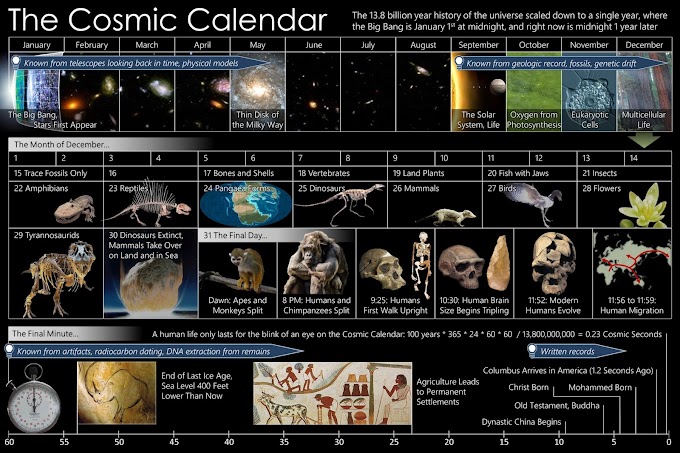Imagine representing the almost 14 000 million years old Universe in just one year of 365 days. The American astrophysicist, writer and popular scientist Carl Sagan also imagined it and tried to accurately set the main milestones in the history of the universe and our particular history on the scale of a year, and this was the result:
- January 1: Big Bang.
- May 1: the Milky Way is formed.
- September 9: the Solar System is formed.
- September 14: Earth is formed.
- September 25: the oldest known rocks on Earth are formed.
- October 2: life on Earth begins.
- December 1: the oxygen atmosphere begins to develop.
- December 17: the first invertebrates appear.
- December 19: vertebrates appear.
- December 20: plants begin to populate most of the Earth.
- December 21: insects appear, animals begin to dominate the Earth.
- December 22: amphibians and winged insects appear.
- December 23: trees and reptiles appear.
- December 24: dinosaurs appear.
- December 26: the first mammals appear.
- December 27: the first birds and the first flowers appear.
- December 28: Mass extinction of the Cretaceous-Tertiary, many life forms died, including dinosaurs.
- December 9: the first primates appear.
- December 30: first evolution of the primate brain, hominids appear.
- December 31, 1:30 pm: the ancestors of apes and men arise.
- December 31, 10:30 pm: the first human beings appear.
- December 31, 11:00 pm: first use of stone tools.
- December 31, 11:46 pm: the domestication of fire.
- December 31, 11:56 pm: most recent glacial period.
- December 31, 11:59 pm: the first known rock painting is done in Europe.
- December 31, 11:59:20 pm: agriculture begins to be practiced.
- December 31, 11:59:50 pm: end of prehistory.
- December 31, 11:59:56 pm: first Greek Olympic Games, beginning of the Roman Empire.
- December 31, 11:59:57 pm: Fall of Rome, first Muslim conquests.
- December 31, 11:59:59 pm: Columbus arrives in America, the Renaissance in Europe.
- December 31, 12:00 pm: Beginning of modern culture, the development of science and technology, the French Revolution, the First World War, World War II, the Apollo reaches the Moon, the rise of the Internet.
 |
| Carl Sagan (1934-1996) |






0 Comments